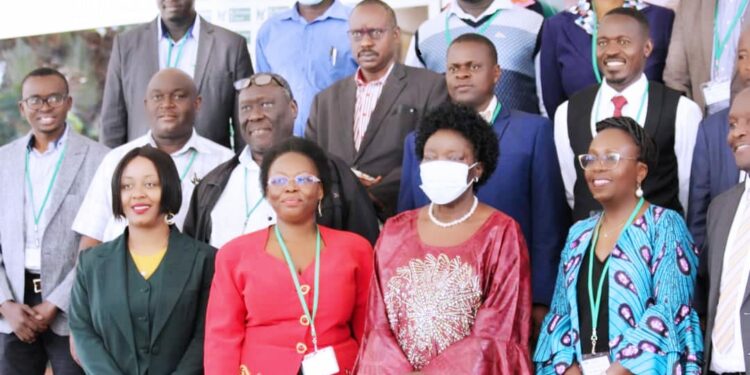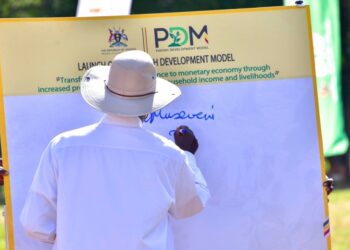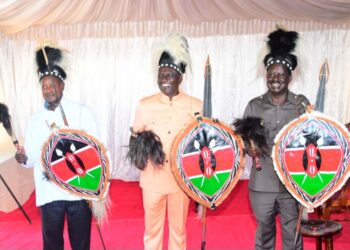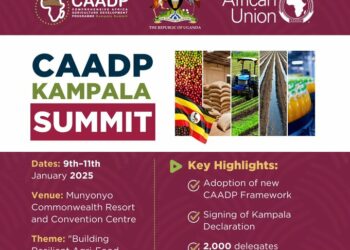By John Kusolo
Rt. Hon. Rebecca kadaga, the Uganda Deputy Prime Minister and Minister of East Africa Community affairs says that the East Africa Community needs to promote the region by finding comparative advantage in agriculture particularly rice farming.
She also noted that the EAC partner states imported 843,227 Metric tonnes of rice majorly from countries like Pakistan, Thailand, China, Vietnam among others valued at $361,488,287.80 while the interregional trade of locally produced rice within the region totaled 104,643 Metric tonnes.
Despite the COVID19 lockdowns, the region imported 601,224 Metric tonnes of rice all valued at $243,625,508.61 reflecting a decrease in quantities of rice imported within the region. She made the remarks during the end of a US$3.1 million dollar grant to a rice sector promotion project which ended this year after a period of three years.
It should be noted that the inter-regional trade among the EAC states is only 15% while with the rest of the world it is at 18%.
Kadaga reminded the rice farmers to stabilize productivity and quality to ensure that trade thrives in this region.
Rt. Hon. Rebecca Kadaga revealed that during the EAC Heads of State summit in July, it was noted that the Common Market was the best way to increase intra-regional trade and spur economic growth in the region.
She also advised the Private sector to invest in Drip Irrigation which is the best for rice farming.
“We should continue with the legacy of Koffi Annan because Africa has the most arable land in the whole world and I wish to see us produce enough food. However, the real challenge is to produce food which will make Africa self-sustainable,” she added.
The Competitive African Rice Initiative in East Africa (CARI-EA), which was implemented jointly by the East African Community (EAC) and Kilimo Trust (KT) seeks to improve the rice sub-sector in the region. The project was approved for funding by Alliance for a Green Revolution in Africa (AGRA) in April 2019 and has now been finalised.
The project targeted to reach 660,000 farming households (220,000 directly and 440,000 indirectly impacted). It aimed to contribute to inclusive transformation of the rice sector in East Africa for sustainable increase in incomes of women, men and young people employed in the value chain of locally produced rice.
The project funding was worth US$3,133,378 courtesy of the US Agency for International Development (USAID) and the German International Cooperation Agency (GIZ) through the Alliance for a Green Revolution in Africa (AGRA), whereby EAC will receive a grant of US$322,600.
CARI-EA has supported the EAC Secretariat to address the most critical bottlenecks in creating an enabling environment for structured trade in rice at both national and regional levels.
Key activities include supporting EAC Partner States governments developing clear rice development plans and mobilize private sector investments in rice mills as well as public sector investments in irrigated rice schemes.
CARI-EA has supported private sector millers to utilize opportunities at the national, regional and extra-regional levels through strengthened market linkages to ensure sustainable rice supply. The project will also carry out assessment of supply chain and logistical constraints and opportunities that hinder processors from attaining desired quality and quantity of paddy from smallholder farmers.
To ensure that farmers sustainably increase productivity to supply the contracted volumes of paddy agreed with SMEs and large traders, CARI-EA will promote the use of irrigation technologies and use of residual moisture during the dry season for a second crop e.g. vegetables or beans so as to enable income continuity for farmers over the year while increasing household food security and reduction in vulnerability.
On its part, the EAC Secretariat will aim to develop an EAC rice trade strategy involving all Partner States, establish the EAC Regional rice platform and increase the membership of private sector processors and rice value chain actors in the industry platform, and undertake research into the issues affecting rice regional trade.
The Secretariat will also establish a rice traceability and certification mechanism for locally produced rice in the EAC and promote the Sanitary and Phytosanitary (SPS) protocol already developed by the Community.
The ultimate aim of the project is to unlock constraints that hinder regional rice trade and thus catalyse growth by stimulating investment, create competitiveness and inclusiveness in the rice industry.
Furthermore, CARI-EA will partner with National Agricultural Research Centres and seed agencies in Partner States to ensure that enough breeder seed is available for multiplication by commercial rice seed companies.
The 13th Sectoral Council on Agriculture and Food Security consequently noted the introduction of a new programme on rice sector development and urged Partner States to support its implementation.
On aflatoxin control and management, the Sectoral Council urged Partner States to address the issue of aflatoxin as serious matter by putting in place measures to address contamination and disposal challenges along the food and feeds value chains.
The Community adopted the EAC Aflatoxin Prevention and Control Strategy, Action Plan and Results Framework adopted by the 36th Council of Ministers in February 2018.
Meanwhile, Country Manager at Alliance for a Green Revolution in Africa (AGRA) John Jaggwe says access to markets stimulates agricultural production and that indeed there is a high potential of trading even beyond the region.
The best rice stakeholders across the East Africa region were awarded including; H. E. Ambassador Phillip Idro, CEO at Upland Rice Millers Co. Ltd. Uganda, Mohammed Sekatawa, a rice processor from Mbale and Jennifer Bash from Tanzania among others.
Kilimo Trust (KT) is a not-for-profit organization working on agriculture for development across the EAC Partner States, namely: Burundi, Kenya, Rwanda, Uganda and Tanzania.
Alliance for a Green Revolution in Africa (AGRA) is a partnership-driven institution that is African-led and farmer-centred.
Founded in 2006, AGRA is transforming smallholder farming in Africa beyond the solitary struggle for survival, into thriving businesses. Its founding partners are the Bill and Melinda Gates Foundation as well as the Rockefeller Foundation.
For nearly 10 years, AGRA’s work across 18 countries was focused on distinct problems related to seed production, soil health, and agriculture markets that were so profound and had been neglected for so long that they required a concentrated effort to resolve.
According to Dr. Birungi Korutaro , CEO Kilimo Trust, many key results were achieved from 2019-2022 as highlighted below:
2,144 New jobs created along the rice value chain.
462 women owned enterprises supported and 397 youth enterprises established.
USD 6,204,690 leveraged from public and private sector investments.
249,880 MT of rice products worth USD 131 Million traded through structured arrangements.
190,096 smallholder farming households integrated in structured input and output markets.
88% adoption of the productivity enhancing technologies.
80,517 farmers (43%) with adaptive/Coping strategies to shocks.
23,571MT to quality agro-inputs (seed and fertilizer) accessed.
25% and 29% increase in productivity among the irrigated and rainfed systems respectively.
313% increase in farmer commercialization.
Up to 85% in farmer incomes.
823% increase in local rice sourcing by engaged rice processors.
271% increment in profitability among engaged SMEs.
A 12-member EAC Rice Platform was launched in January 2020.
3 new rice brands (ZAABU, Mealtime, and Farmers Pride) were developed and introduced on the market.
Do you have a story in your community or an opinion to share with us: Email us at editorial@watchdoguganda.com













